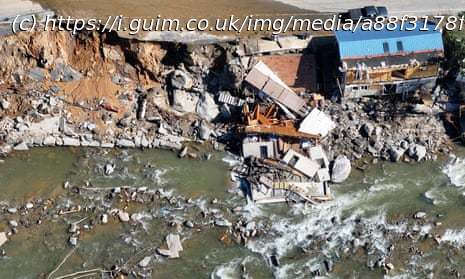Behind the violence of extreme weather is that of the fossil fuel industry, and Americans are suffering for it
The weather we used to have shaped the behavior of the water we used to have – how much and when it rained, how dry it got, when and how slowly the snow in the heights melted, what fell as rain and fell as snow. Climate chaos is changing all that, breaking the patterns, delivering water in torrents unprecedented in recorded history or withholding it to create epic droughts, while heat-and-drought-parched soil, grasslands and forests create ideal conditions for mega-wildfires.
Water in the right time and quantity is a blessing; in the wrong ones it’s a scourge and a destroying force, as we’ve seen recently with floods around the world. In the vice-presidential debate, Tim Walz, the Minnesota governor, noted that his state’s farmers “know climate change is real. They’ve seen 500-year droughts, 500-year floods, back to back.” Farmers around the world are dealing with flood, drought and unseasonable weather that impacts their ability to produce food and protect soil.
The rainfall from Hurricane Helene turned into a torrent on the Nolichucky River in east Tennessee that at its height, was almost twice the normal flow of Niagara Falls. The water in that river and others overtopped dams and triggered fears that the dams might break. In western North Carolina, the French Broad River that runs through Asheville crested at an unprecedented level, thanks to dozens of inches of rain in the surrounding mountains draining fast into its tributaries.
Water became a violent force tearing apart buildings, streets, neighborhoods, drowning humans and animals, while winds toppled trees across the region, the grip of their roots weakened by the rain-saturated soil. Roads, bridges, transmission lines, and crucial infrastructure were swept away or smashed. Scientists at Lawrence Berkeley National Laboratory estimate that “climate change may have caused as much as 50% more rainfall during Hurricane Helene in some parts of Georgia and the Carolinas.






